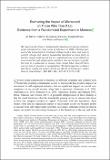Estimating the Impact of Microcredit on Those Who Take It Up: Evidence from a Randomized Experiment in Morocco
Author(s)
Crepon, Bruno; Devoto, Florencia; Duflo, Esther; Pariente, William
DownloadDuflo_Estimating the.pdf (700.9Kb)
PUBLISHER_POLICY
Publisher Policy
Article is made available in accordance with the publisher's policy and may be subject to US copyright law. Please refer to the publisher's site for terms of use.
Terms of use
Metadata
Show full item recordAbstract
We report results from a randomized evaluation of a microcredit program introduced in rural areas of Morocco in 2006. Thirteen percent of the households in treatment villages took a loan, and none in control villages did. Among households identified as more likely to borrow, microcredit access led to a significant rise in investment in assets used for self-employment activities, and an increase in profit, but also to a reduction in income from casual labor. Overall there was no gain in income or consumption. We find suggestive evidence that these results are mainly driven by effects on borrowers, rather than by externalities.
Date issued
2015-01Department
Massachusetts Institute of Technology. Department of EconomicsJournal
American Economic Journal: Applied Economics
Publisher
American Economic Association
Citation
Crepon, Bruno, Florencia Devoto, Esther Duflo, and William Pariente. “ Estimating the Impact of Microcredit on Those Who Take It Up: Evidence from a Randomized Experiment in Morocco.” American Economic Journal: Applied Economics 7, no. 1 (January 2015): 123–150. © 2015 American Economic Association
Version: Final published version
ISSN
1945-7782
1945-7790